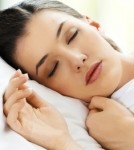How to Eat for Better Sleep


A good night’s sleep is one of the foundations of well-being. If you are battling an illness, sleep is your body’s time to repair and strengthen its defenses. If you are healthy, getting enough quality sleep helps to keep you feeling good and gives you the energy you need to tackle all the responsibilities of your busy life.
One of the simplest tricks for improving sleep is modifying your diet. It couldn’t be easier. All you have to do is learn what foods help you sleep and what foods keep you from getting the rest you need.
Foods that Keep You Up at Night
When it comes to food and drinks that hinder sleep, caffeine is usually the first ingredient that comes to mind. Of course that strong “cup of Joe” that gets you going at 8 a.m. is not going to help relax you when your head hits the pillow! What many patients don’t realize is that caffeinated beverages consumed as early as four o’clock in the afternoon can interfere with sleep. If you’re an afternoon coffee drinker, try to have your last cup no later than 3 p.m. so the caffeine has plenty of time to exit your system.
If you have gotten your coffee consumption under control by switching to tea, you may need to alter your habits as well. It’s true that many teas contain less caffeine than coffee, and herbal teas are caffeine free. Some of my patients have taken a liking to green tea in recent years because of its many antioxidant health benefits. If you sip this beverage at night, however, it could have just as much of an effect on your sleep as a cup of basic black tea. The rule of thumb when it comes to caffeine, then, is sip early to sleep better.
The other beverage that interferes with sleep is alcohol of any kind. Though it may make you tired initially, it is likely to bring a restless night with frequent waking. A glass of wine or beer with dinner should not cause problems. If you like a cocktail in the evening, make it a pre-dinner drink rather than a nightcap. When it comes to any beverage before bed, including water, try not to sip within 90 minutes of going to sleep. It takes about that much time for your body to process the beverage. You may be surprised how effective this simple change can be at keeping you from waking up to visit the bathroom.
If you suffer from indigestion or heartburn, you know that any food can cause trouble sleeping if you eat too much. If you can’t have dinner before 8 p.m., keep your portions in check to promote healthy digestion. Avoid spicy foods, which can kick up your metabolism and cause heartburn, both factors that make sleep more difficult.
Although lean protein is an important part of a healthy diet, eating a lot before bedcould make you less restful. Protein stimulates brain activity and increases metabolism. If you like to have a snack at night, make sure you balance the protein with carbohydrates. Try peanut butter on toast or a banana with yogurt. Some studies show that carbs combined with small amounts of protein help the body produce serotonin, the “calming hormone.”
Foods that Get the Green Light for Sleep
We’ve all heard about the chemical in turkey that makes us sleepy after Thanksgiving dinner. It’s called tryptophan and most of us consume it far more often than once a year. Tryptophan is present in all poultry, including chicken. Dairy is also rich in tryptophan, making a glass of warm milk a helpful evening beverage. Other high-tryptophan foods are bananas, oatmeal, honey and peanuts. Here are some bedtime snack ideas, all combining healthy carbs with a little protein:
1) One packet of instant oatmeal with one tablespoon of chopped nuts.
2) Wheat toast with peanut butter and honey.
3) Cottage cheese on whole grain crackers with tomato slices.
4) Half of a small turkey sandwich.
5) An apple and lowfat string cheese.
If you keep these simple dietary tips in mind, you too can experience the holiday season well-rested and more joyfully than ever!